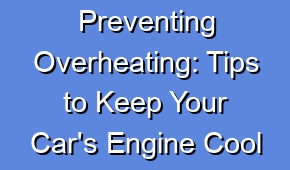Preventing Overheating: Tips to Keep Your Car’s Engine Cool

To prevent overheating, regularly check coolant levels, inspect hoses for leaks, ensure radiator is working properly, and avoid driving in hot weather for long periods.
Preventing Overheating in your car is crucial for engine health. Follow these tips to keep your car’s engine cool. Regularly check your coolant levels and top up when needed. Inspect cooling system hoses for any signs of wear and tear. Ensure your radiator is clean and free of debris. Use a heat-resistant coolant and consider adding a coolant additive. Avoid driving in extreme heat and monitor your engine temperature gauge. Remember to schedule regular engine maintenance to prevent overheating issues. By following these tips, you can keep your car’s engine running smoothly.
| Regularly check coolant levels to prevent overheating. |
| Inspect radiator hoses for any leaks or cracks. |
| Make sure the cooling fan is functioning properly. |
| Clean debris from radiator fins for better air flow. |
| Use a heat-resistant coolant to avoid engine overheating. |
- Replace thermostat if engine temperature continues to rise.
- Avoid driving in extreme heat conditions.
- Check engine oil levels regularly.
- Park in shaded areas to prevent engine from overheating.
- Allow engine to cool down before checking coolant levels.
How Can I Prevent Overheating in My Car?
To prevent overheating in your car, make sure to **check** the coolant levels regularly.
Why is My Car Overheating?
Your car may be overheating due to a **leak** in the cooling system or a faulty thermostat.
When Should I Check My Car’s Coolant Levels?
Check your car’s coolant levels **regularly**, especially before long drives or in hot weather.
What Should I Do If My Car Starts to Overheat?
If your car starts to overheat, **pull over** immediately and turn off the engine.
How Can I Keep My Engine Cool in Hot Weather?
Keep your engine cool in hot weather by **parking** in the shade or using a car shade.
Can Low Oil Cause Overheating?
Low oil can cause overheating as it **reduces** lubrication and cooling efficiency.
Is it Safe to Drive a Car That is Overheating?
It is not safe to drive a car that is overheating as it can **cause** serious engine damage.
What Are the Signs of an Overheating Engine?
Signs of an overheating engine include **steam** coming from the hood and a high temperature gauge.
Why is Coolant Important for Preventing Overheating?
Coolant is important for preventing overheating as it **regulates** the engine temperature.
How Often Should I Replace My Car’s Thermostat?
Replace your car’s thermostat every **50,000** miles or as recommended by the manufacturer.
What Are Some Common Causes of Engine Overheating?
Common causes of engine overheating include **coolant leaks**, a faulty thermostat, or a clogged radiator.
How Can I Check for Coolant Leaks in My Car?
Check for coolant leaks in your car by **inspecting** the radiator, hoses, and water pump.
What Are the Effects of Engine Overheating?
Engine overheating can lead to **engine** damage, warped cylinder heads, and blown gaskets.
Why Does My Car Overheat When Idling?
Your car may overheat when idling due to a **faulty** cooling fan or low coolant levels.
What Should I Do If My Car Keeps Overheating?
If your car keeps overheating, **seek** professional help to diagnose and fix the issue.
How Can I Prevent Overheating During Summer Road Trips?
To prevent overheating during summer road trips, **check** your car’s cooling system before you leave.
Can Driving at High Speeds Cause Engine Overheating?
Driving at high speeds can cause engine overheating due to **increased** friction and heat generation.




















